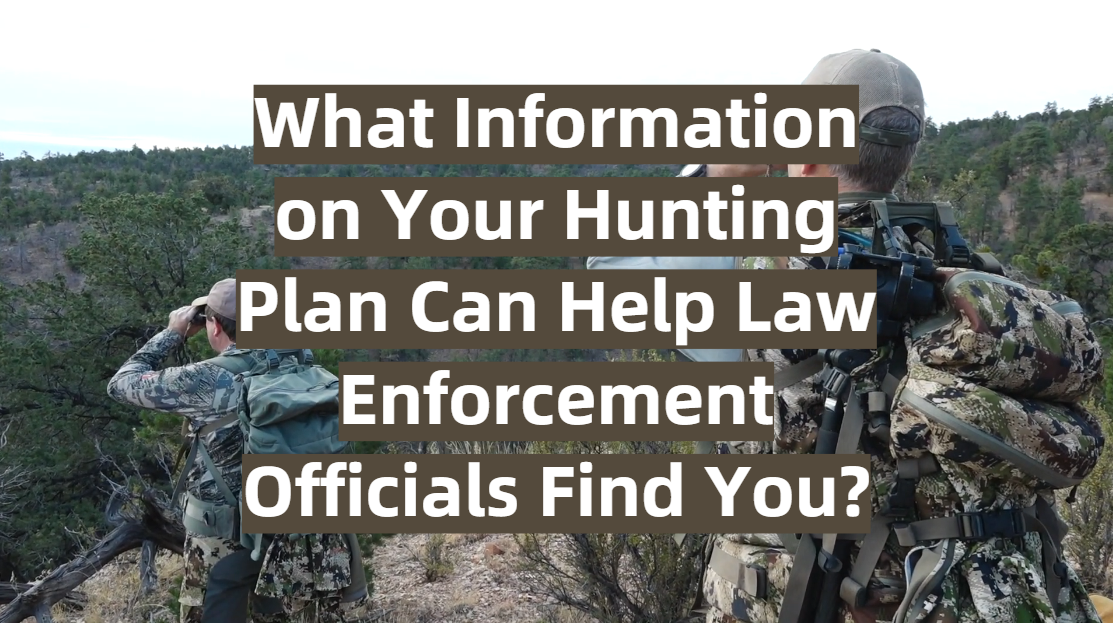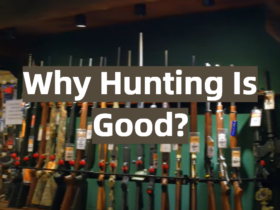The more information a hunter shares about their hunting plan, the easier it is for law enforcement officials to find him or her in an emergency.
It might be tempting to give a false name or say that you are going somewhere other than where your map says. However, this is not wise because it can lead to problems later on with law enforcement officials if something goes wrong during the hunt.
Hunters need to know exactly what information they should share and how far they should go in sharing their hunting plan details before leaving for the trip. It’s best to err on the side of caution by giving too much information rather than risk running into trouble when something unexpected happens out there!
Table of Contents
What is a hunting plan?
A hunting plan is a written set of data that details your route, the number of days you will be gone, and where you are going to hunt. It should also include what campsites you’ll use during the trip. If something happens while out in the woods (like an injury or medical emergency), having this information with law enforcement officials ensures they can find you quickly before it’s too late!
What should your hunting plan include?
It’s important to list the following items in your hunting plan: a description of each area you intend to hunt, put in writing what equipment and supplies you have with you, also be aware that this is an ideal time for putting together a survival kit.
A good way to do so would be by having something like a life straw filter bottle or add reflective tape on all outdoor items such as clothing or gear.
The more visible these things are from miles away when looking down from above will make it easier for search aircraft/helicopters to spot them! If there was ever an emergency while out in the wild, being spotted quickly ensures lives can be saved before it is too late.
Some other important things that should be included in your hunting plan are:
- any known water locations;
- the date you leave and return home (where applicable);
- what vehicle(s) will be used to get there;
- where they’ll be parked when not being used;
- who is going on this trip with you;
The last one might seem a bit strange because if something were to happen while out in the woods it would only take a few minutes for search aircraft/helicopters or rescuers to locate anyone else besides yourself – however, just making sure someone knows where you have gone off to can mean everything! In some cases, people go missing from an area after receiving phone calls at their campsite hours before law enforcement officials are notified.
If someone knows where you are and when to expect your return, it makes all the difference in locating you quickly that increases chances of survival!
No matter what area you plan on hunting in, it is important that others know about your plans ahead of time. Whether this means putting together a detailed hiking safety guide or just letting friends/families know where you’ll be can help save lives if something should happen while out enjoying nature’s wonder!
What information on your hunting plan can help law enforcement:
- When and where you’ll be hunting;
- What route you will take to get there and back. This can include information about roads, trails, landmarks, etc. that we might find helpful when trying to locate your camp or general whereabouts in case of an emergency situation at home or while out on a hunt without cell phone service/coverage (i.e., law enforcement’s GPS coordinates);
- What equipment you’ll bring. Not only can it be helpful for search and rescue to know the type of gear/equipment we might find on-site at your campsite or in a pack while searching, but law enforcement officers may need to utilize some specific items that could help us locate you if necessary (i.e., binoculars, GPS unit);
- The number of people hunting with you. This is especially important information because multiple hunters will have an increased impact on wildlife populations being hunted as well as more risk from potential injury due to several individuals involved in an accident situation requiring a large-scale search effort. Law enforcement officials want to ensure they are not wasting resources looking for someone who was never missing;
FAQ
What is the reason to plan and prepare for a hunting trip?
It is important to plan and prepare for a hunting trip because that will help you better know what resources you need, such as food, survival tools, etc. It will also give you an idea of the total cost before starting your journey. This way it’s easier to manage your budget and make sure all costs are covered.
Also, you should include your detailed route for your family, friends, and anyone who might be looking for you in case of an emergency. It helps them know where to look when they are worried about not being able to reach you. The more detail the better! This way it’s easier for everyone involved to feel safe while waiting for news on your trip.
Where can you find the hunting regulations for the area where you plan to hunt?
In the United States, hunting regulations vary from state to state and even county to county. Some websites may be helpful for finding local hunting laws depending on your location. The first website that can be helpful is the National Shooting Sports Foundation.
Another option for finding local hunting laws in your area would be visiting your state department’s fish and wildlife conservation webpages or departments (or similar organizations).
Hunter Ed is another useful source of information for hunters online.
When planning a hunt with strenuous activity, what should a hunter do well in advance of the hunt?
If you are required by your state’s regulation, or simply choose to document your hunts with pictures and videos as many hunters do these days, having a clear record of what took place at each location during the hunt makes things easier for authorities who may need this information later on. It’s recommended then that before starting their trip into the wilderness, hunters set out boundary markers so that all locations used during the hunt are clearly marked.
In addition, marking these boundaries is also important from a safety standpoint since those same officers must first locate where exactly they were before trying to figure out how best to proceed in their search.
When accidents happen, it can be very helpful to have a record of where you were when the incident took place so that authorities know exactly which area they need to start searching for you right away. When things go wrong on any hunt, having this information is key since time really matters in these situations, and hunting after dark does not provide enough light to work with as well as making it much more dangerous than during daylight hours.
When you go on a hunting trip you should leave a hunting plan with someone?
Not doing so can potentially put your life at risk. You should leave the following information with someone:
- Name of hunting area;
- The date you are leaving for the hunt;
- Expected date to return home from the trip;
- Your physical description (height, weight, hair color);
This will allow officials to find you if any accidents were to occur or if something happens that requires emergency assistance.
What are the three behaviors of a responsible hunter?
A responsible hunter would do the following:
- Know state hunting regulations. Many hunters believe that if they are seen by law enforcement, these officers will understand their mistake and give them a warning. This is not often the case because there are many hunters who break rules but go undetected due to a lack of wildlife personnel or other factors. If you make friends with local police officers before your hunt begins, it can help to ensure better communication about any violations made during the season;
- Leave personal property at home when on public land for safety reasons as well as those mentioned above in this paragraph. Keeping items such as purses and wallets hidden from plain sight helps prevent theft while also preventing unnecessary interaction between someone passing through an area looking for food and the hunter;
- Maintain visual contact with your hunting dog at all times when in a public area to prevent being accused of running dogs off-leash, which is illegal on many properties (especially national parks). If you do not plan on bringing one along during the hunt, make sure that someone else does or keep an electronic collar around their neck so they can find them quickly if they run too far away from you while chasing the game;






Leave a Reply